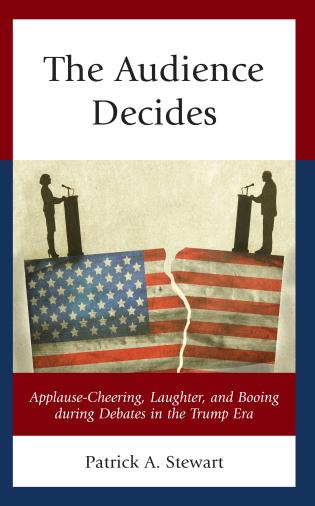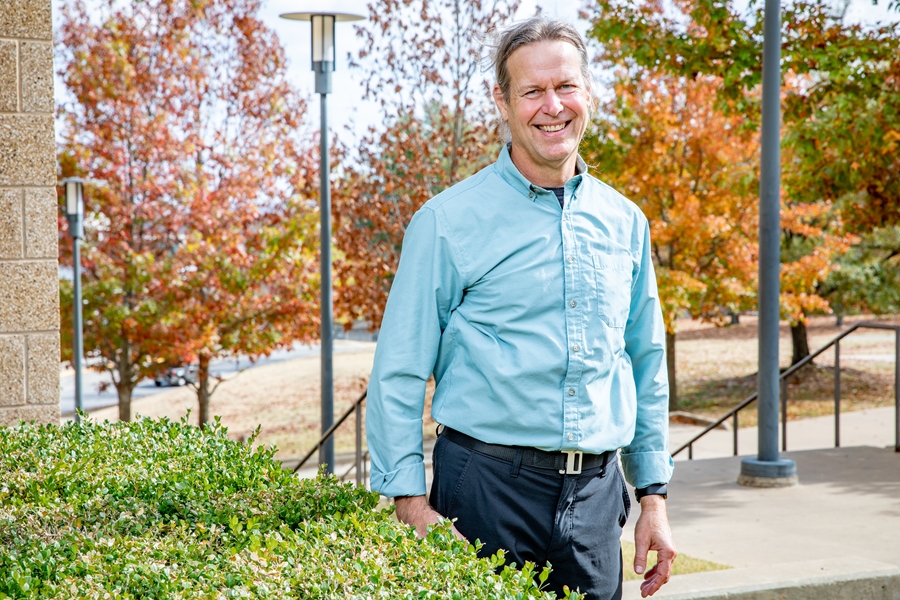With the presidential primary season rapidly approaching, the public will be introduced to an array of often unfamiliar candidates from both major parties. Traditionally, presidential debates — especially during the primary season — have been a means of differentiating between candidates on the basis of their leadership qualities and the positions they hold on important issues of national interest.
A new book by U of A professor of political science Patrick A. Stewart, The Audience Decides: Applause-Cheering, Laughter, and Booing during Debates in the Trump Era, argues that this may no longer be the case. By looking closely at the 2016 and 2020 presidential primary debates, Stewart charts how both major political parties have largely abdicated their responsibility to identify and vet the best candidates from which citizens choose to lead their respective party and ultimately, the country.
What sets the book apart is its focus on the influential role played by the studio audience during debates through their applause-cheering, laughter and booing of the candidates, and how this in turn affects reporters and everyone watching at home.
The desire by the networks for higher ratings and by the political parties for more followers has arguably led to debates having more candidates that are less qualified onstage. This leads to antagonistic candidates competing with each other for limited speaking time as well as for the in-person audience reactions mentioned above. The resulting chaos at these debates often comes at the expense of enlightening  the public about the candidates’ leadership abilities and political values. In short, entertaining the public overshadows educating American voters.
the public about the candidates’ leadership abilities and political values. In short, entertaining the public overshadows educating American voters.
Stewart notes that “(W)hen it comes to the candidates on-stage, more isn’t necessarily better, nor even more entertaining. If anything, the near incessant interruptions by challengers contending for speaking time and attention can detract from not just viewer enlightenment, but also their enjoyment. Because ultimately the in-person audience and those viewing at home decide who they will follow through these debates, these events, or whatever replaces them, should aim not just to entertain, but also educate viewers about the leadership qualities held by the candidates.”
The Audience Decides relies upon meticulous observational methods to consider nonverbal behaviors by candidates to establish on-stage dominance and the response by the in-person audience. These observable audience responses in turn affect reporters covering the debates as well as people watching at home, driving online searches based on a candidate’s debate performance.
Ultimately, Stewart proposes that the findings from The Audience Decides be used to evaluate and reconsider how debates, or alternatives to them, are structured to reveal the leadership traits and skills needed by our leaders in an increasingly complex world. The resulting televised events should not just entertain, but enlighten the most important part of representative democracy — the voting public.
About the University of Arkansas: As Arkansas' flagship institution, the U of A provides an internationally competitive education in more than 200 academic programs. Founded in 1871, the U of A contributes more than $2.2 billion to Arkansas’ economy through the teaching of new knowledge and skills, entrepreneurship and job development, discovery through research and creative activity while also providing training for professional disciplines. The Carnegie Foundation classifies the U of A among the few U.S. colleges and universities with the highest level of research activity. U.S. News & World Report ranks the U of A among the top public universities in the nation. See how the U of A works to build a better world at Arkansas Research and Economic Development News.
Topics
Contacts
Patrick Stewart, professor of political science
Fulbright College of Arts and Sciences
870-933-0907, pastewar@uark.edu
Hardin Young, assistant director of research communications
University Relations
479-575-6850,
hyoung@uark.edu
